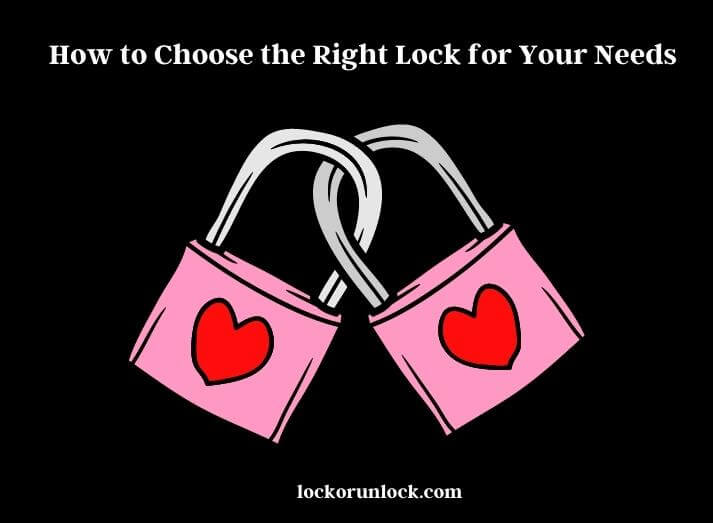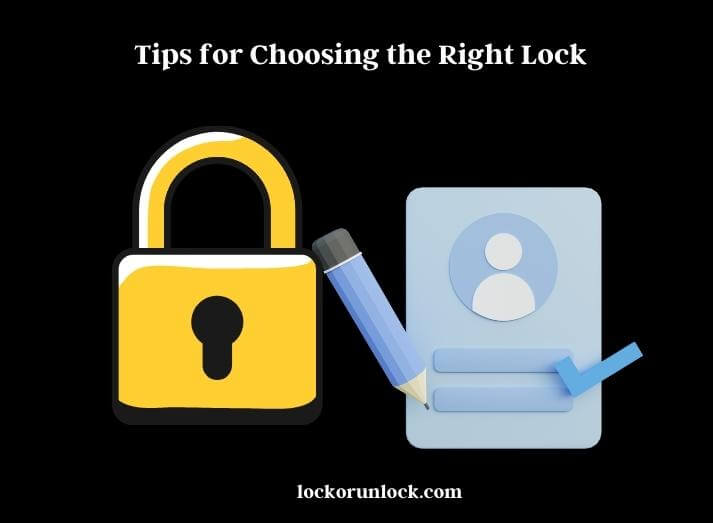When it comes to securing your home or property, choosing the right lock is one of the most important decisions you can make. A lock is the first line of defense against burglars and intruders, and selecting the wrong one could leave your home or property vulnerable to theft or break-ins. With so many lock options available, it can be challenging to determine which one is best for your needs.

When it comes to your safety, nothing is more important than choosing the right lock for your needs. Whether you’re looking to secure your home, office, or vehicle, having the right lock can mean the difference between a secure and secure space, or an easy target for intruders.
With so many different types of locks available, it can be difficult to know which one is right for you. From traditional mechanical locks to digital smart locks, the options are seemingly endless.
Security Needs
When it comes to choosing a lock, the first and most crucial factor to consider is your security needs. Security needs can vary widely depending on the property you’re trying to secure, the area you live in, and other factors. Assessing your security needs will help you determine the level of security you require from your lock and the type of lock that’s best suited to your needs.
If you’re securing a residential property in a high-crime area, you’ll likely require a lock that offers a higher level of security than if you’re securing a commercial property in a low-crime area. In general, the higher the security risk, the more secure the lock you’ll need.
There are different levels of security offered by locks, ranging from basic locks to high-security locks. Basic locks are the most common and affordable type of lock, but they may not be sufficient for high-security needs. High-security locks, on the other hand, are designed to provide the highest level of protection and may include features such as drill-resistant materials and pick-resistant mechanisms.
It’s essential to match your security needs with the appropriate lock type. Choosing a lock that offers too little security could put your property at risk while selecting a lock that offers too much security could be an unnecessary expense. Consider your security needs carefully when selecting a lock to ensure that you’re getting the level of protection you require.
Lock Types
Locks come in different types, and each has its advantages and disadvantages. When selecting a lock type, you should consider factors such as your security needs, budget, and the lock’s intended use. Here are some of the most common lock types to choose from:
Deadbolts
Deadbolts are stationary locks that require a key or a thumb turn to operate. They offer a high level of security and are commonly used on residential doors. Deadbolts come in different types, including single-cylinder, double cylinders, and smart locks.
Padlocks
Padlocks are portable and versatile locks that can be used on a variety of items, including doors, gates, and storage units. They come in different sizes and materials and are available as keyed or combination locks.
Cam Locks
Cam locks are commonly used in cabinets, drawers, and mailboxes. They require a key to operate and offer a basic level of security.
Combination Locks
Combination locks are locks that use a sequence of numbers or letters to open. They are commonly used on lockers, safes, and gates.
Smart Locks
Smart locks use technology such as Wi-Fi, Bluetooth, or a mobile app to operate. They offer features such as remote access, keyless entry, and voice control.
When choosing a lock type, consider the level of security you need, the lock’s intended use, and your budget.
Lock Materials
Another essential factor to consider when choosing a lock is the material it’s made of. The lock’s material will determine its strength, durability, and resistance to tampering. Here are some common lock materials to consider:
Steel
Steel is one of the most common materials used in locks. It’s strong, durable, and resistant to tampering. High-grade steel locks can offer excellent protection against forced entry.
Brass
Brass is a popular material for padlocks and door locks. It’s corrosion-resistant, aesthetically pleasing, and offers moderate security.
Aluminum
Aluminum is a lightweight and durable material that’s commonly used in padlocks and combination locks. It’s affordable and resistant to rust and corrosion.
Zinc
Zinc is a material commonly used in cam locks and cabinet locks. It’s affordable, easy to machine, and provides moderate security.
Titanium
Titanium is a high-strength metal that’s lightweight, durable, and resistant to corrosion. It’s commonly used in high-security locks and is the most expensive lock material.
When selecting a lock, consider the lock’s intended use, your security needs, and your budget. Steel locks offer the highest level of security but can be more expensive.
Additional Features
Regarding the lock type and material, there are other features to consider when choosing a lock. These features can provide added security and convenience. Here are some additional features to consider:
Keyway
The keyway is the opening in the lock where the key is inserted. The keyway’s design can affect the lock’s security and resistance to picking and bumping. Look for locks with high-security keyways to ensure your lock is less vulnerable to attacks.
Anti-Drill Plates
Anti-drill plates are metal plates located on the lock’s exterior that prevent drill bits from penetrating the lock. They provide an added layer of protection against forced entry.
Key Control
Key control refers to the ability to control the distribution of keys. High-security locks often come with patented keyways, which prevent unauthorized duplication of keys.
Rekeying
Rekeying is the process of changing the lock’s internal pins to match a new key. This feature is useful if you need to change the lock’s access without replacing the entire lock.
Smart Features
Smart locks offer additional features such as remote access, voice control, and keyless entry. These features provide convenience and can improve the lock’s security.
When selecting a lock, consider these additional features to enhance your lock’s security and convenience. Look for high-security keyways and anti-drill plates to prevent forced entry. Choose locks with patented keyways and rekeying features to control key distribution.
Price Considerations
Price is an important factor to consider when choosing a lock. Locks come in a range of prices, and the cost will depend on the lock’s type, material, and additional features. Here are some price considerations to keep in mind:
Budget
Consider your budget when choosing a lock. Determine how much you’re willing to spend and choose a lock that meets your security needs and budget.
Value for Money
Look for locks that provide good value for money. Consider the lock’s features, durability, and security level and compare it with the price.
The Total Cost of Ownership
The total cost of ownership includes the lock’s purchase price, maintenance costs, and replacement costs. Consider the lock’s long-term costs when making your decision.
Professional Installation
Some locks require professional installation, which can add to the overall cost. Consider the installation cost when choosing a lock.
Warranties
Look for locks that come with warranties. A warranty can provide added peace of mind and protection against defects and failures.
Tips for Choosing the Right Lock
Here are some tips for choosing the right lock:

Assess Your Security Needs
Before choosing a lock, assess the level of security you need. For instance, a high-security lock may be more appropriate for a commercial building than a residential property.
Choose the Right Type of Lock
There are many different types of locks available, each with its own strengths and weaknesses. Choose the type of lock that best suits your needs. For instance, a deadbolt lock is great for securing doors, while a padlock is suitable for securing gates, fences, and storage units.
Look for a Reputable Brand
Choose a lock from a reputable brand that is known for producing high-quality products. Look for reviews and ratings from previous customers to get an idea of the lock’s quality and reliability.
Consider the Lock’s Material
The material used to make the lock can affect its strength and durability. Choose a lock made from high-quality materials such as steel or brass.
Check for Certifications
Look for locks that have been certified by independent testing organizations such as the American National Standards Institute (ANSI) or Underwriters Laboratories (UL). These certifications indicate that the lock has undergone rigorous testing and meets certain standards of quality and security.
Consider the Price
The price of the lock should also be a consideration. While it’s important to choose a lock that provides the level of security you need, you don’t want to overspend on a lock that is beyond your budget.
By following these tips, you can choose the right lock that will provide the security and peace of mind you need.
Conclusion
Choosing the right lock is essential to protect your property and ensure your safety. When selecting a lock, consider your security needs, the lock type and material, additional features, and price. Look for high-security locks that provide good value for money and consider the long-term costs of ownership.
Choose a lock that meets your security needs and budget, and don’t forget to consider additional features such as anti-drill plates, key control, and smart features. Remember, the highest price doesn’t always guarantee the highest level of security, so choose the lock that provides the best security and value for your budget. With the right lock, you can have peace of mind knowing your property and loved ones are protected.
If you want to know about Can-Am Defender with Halo Locker? Click here for details.
